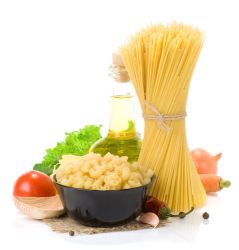Glucose (sugar) is our body's primary source of energy and is in our bloodstream at all times. Our bodies rely on the energy supplied by glucose to perform the most basic of functions–without glucose, our bodies would cease to function. Too much glucose though, can lead to a host of health problems including weight gain, heart disease and more.
We get our daily supply of glucose from the foods we eat. For the most part, carbohydrates are the primary source of glucose. Carbohydrates also may include other sugars such as fructose or sucrose. When we eat the carbs, they are broken down by the digestive system, which releases the glucose into the bloodstream. From there, it is transported throughout the body to be used as fuel. Interestingly, when the body is faced with a lack of carbohydrates, it can convert fats and even proteins into glucose as well. That goes to show you just how important glucose is to the body.
This is where gluconeogenesis comes into play. The word 'gluconeogenesis' literally means to make new glucose. The process primarily takes place in the liver (and to a lesser degree in the kidneys), which uses enzymes to convert the glycerol backbone of lipids or amino acids—which are actually the building blocks of protein—into glucose, which is then released into the bloodstream to be used as fuel.
Gluconeogenesis plays an important role in the body by keeping blood glucose levels from dropping to dangerously low levels. When blood glucose levels are too low, hypoglycemia can set it. Hypoglycemia is a condition that occurs when your blood sugar (glucose) is too low. Blood sugar below 70 mg/dL is considered low. Blood sugars at this level can cause harm to the body, including seizures and even coma. Symptoms of hypoglycemia include cold sweats, convulsions, shaking or trembling, tingling or numbness of the skin or excessive weakness.
Essentially, gluconeogenesis is designed to function as a safety mechanism to protect our bodies from harm during times when we do not have access to carbohydrates. Back in the days of our ancestors, this would have been a fairly common occurrence during times when food sources were scarce. Gluconeogenesis is really a 'last-resort' process through which the body creates fuel during desperate times.
Without a backup safety plan such as this, human beings might have died out a long time ago. In modern man, gluconeogenesis is primary brought about during excessive periods of fasting, starvation or extremely intense periods of exercise. It can also be initiative by certain very low-carbohydrate diets. Even in these cases however, the process does not initiate until the body has largely expended most of its existing glucose reserves.
When glucose enters the bloodstream, much of it goes directly to the brain and other organs where it is used as fuel. Excess glucose in the bloodstream triggers the insulin response, which then stores the 'extra' glucose in fat, muscles and the liver. The body can then use it during periods of low blood glucose to provide a consistent fuel source.
When the body isn't able to obtain sufficient glucose from foods and what it has squirreled away, that's when gluconeogenesis kicks in. During this process, non-carbohydrate precursors–such as lactate, pyruvate, glycerol and some amino acids–form glucose. Glycerol, a primary precursor, is released from fat cells through the process of lipolysis, which is the breakdown of triglycerides. Two of these molecules can make one glucose molecule. Skeletal muscle can even be broken down to make glucose if the availability from food energy is insufficient to meet the body's needs. Generally, the liver maintains an approximate 24-hour supply of glucose. When this is depleted and if there is no food energy available, gluconeogenesis will begin.
Some people believe that excessive consumption of protein can also trigger gluconeogenesis. The body primarily uses proteins for structural and repair functions. So in a given day, if the body needs 60 grams of protein to do everything it needs to accomplish and you ingest 60 grams of protein that day then there is no protein left over that could be converted to glucose. However, if on that day you ingest 100 grams of protein, the body would have 40 grams of protein just 'hanging around,' that could be converted to glucose through gluconeogenesis.
While it is not really important to understand the complexities of the entire process, it is worthwhile to have a basic understanding of the process of gluconeogenesis, what triggers it, and its impact on our bodies.
More Information About Muscle Building Click Here
Source 4 Foods Never To Eat





No comments:
Post a Comment
What do you think about this quote? What's your favorite The Hangover. quote?